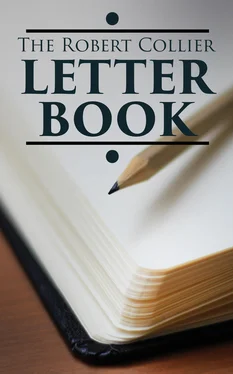They described their products to the best of their ability, they followed the usual rules of attention and interest, but for their main argument they used proof.
One of their most effective letters read:
When 10,000 men from all over the country send all the way out here just to get a raincoat, there must be something unusual about these coats. And when a man like John Jones of such and such a street in your town (and here they gave the name of an actual buyer in the town, frequently a man whose name was well known) not only sends for a Blank Coat, but is so well pleased with it that he writes: "Your Blank Coat is not only the finest quality and the best fit I have had in a coat for a long time, but an unusual value. I haven’t been able to find its equal in our local stores at twice the price."
When thousands of well-dressed business and professional men from all over the country write us letters like that, and when more than a dozen of your own fellow townsmen have sent for this same coat, and liked it so well that they gladly sent up $14.65 for it and felt that they were saving $ 10 to $15 each when they did it—don’t you think it would be worth your while to at least look at so unusual a value, especially when the enclosed card will bring one to you in your exact size without one penny of cost or one bit of obligation?
In the beginning, of course, it was more difficult. They had no ten thousand customers to refer to. So at the start they depended for their proof upon the "free-examination, no-money-until-you-have-tried-it-for-a-week-plan." That helped to establish confidence. And as fast as they got an order they did their utmost to turn it into a satisfied customer from whom they could get a testimonial. The testimonials were bait, and with them they tempted every man in the town or state where the writer lived.
That the idea was sound was proved by the results. Tucked away off in a comer of Pennsylvania, in a town no one had ever heard of, without capital, without special advantages of any kind, they built their business to a volume of over a million dollars. Why? Because statements which, coming from themselves, would have been laughed at, were accepted at face value when they came from the mouths of their customers. Perhaps even this alone might not have been convincing had they not backed up these statements with the "free-examination, no-money-until-you-have-tried-it-for-a-week' idea, which showed that they not only believed the statements to be true, but had every confidence in the ability of the goods to back them up.
Every sales letter must have argument or proof of some kind, but all the argument in the world is not equal to proof such as this: "You know Jim Jones, who lives over on Vesey Street, a few blocks from you. Here is what he says . . . But we don't ask you to take his word for it. We don't ask you to believe even such men as this Senator, and that Congressman, and a nationally known banker or lawyer or whatnot. Try it for yourself and see! The enclosed card brings it to you without cost and without obligation, for a week's free try out."
What is it that sells patent medicines by the millions every year? What is it that makes men swallow gallons of nasty, unpalatable nostrums, pounds of seaweed, and yeast cakes put up in all manner of forms? Proof! A man describes your symptoms with such exactitude that you think he must have taken a look down your epiglottis, then assures you that one dose or a dozen pills or cakes of yeast relieved him of every trace of his ailment.
What is there for you to do but to try some of the same? If the remedy was so efficacious with him, you naturally reason it will not do any harm to try a little of it yourself. And so the sales go on.
We are a credulous people, but we have become so accustomed to hearing every one claim that his product is the best in the world, or the cheapest, that we take all such statements with a grain of salt. Let some third person make the statement, however, apparently from excess of enthusiasm over the wonderful value or service he has received, and we prick up our ears. Let that be backed by positive proof and we are ready to risk our money.
For that reason, it usually pays to put a testimonial into every letter you write. I know one unusually successful mail order man who will not let even a collection letter go out of his house without a testimonial in it. And I believe he is right. For why doesn't your customer pay his bill? Frequently because he is not satisfied with your product, not quite sold on the idea that it is as good value for the money as he had expected. More than anyone else, he needs to be convinced of this, and what surer way to convince him than through the mouth of some one who has used it?
True, testimonials are in rather bad odor of late, due to the way advertisers have run after celebrities and bought their endorsement of everything from chewing gum to pajamas. But there never will be a time when a testimonial, which has the ring of truth about it, will not be a potent factor in dispelling doubt in the mind of a hesitant customer.
CHAPTER 7
SUPPLYING THAT IMPULSE
Table of Contents
Watch the crowd in front of a sideshow. At just the critical moment in the barker's talk, his assistants on the outside of the crowd start a general push forward towards the ticket window.
In every sale, whether in person or by mail, there comes that same critical moment. Your prospective customer is almost convinced.
You have his attention, you have aroused his interest, you have just about persuaded him that he must have the thing you are offering, you have proved to him beyond question that it is the best or the cheapest; but he is not quite ready to sign on the dotted line. Caution, inertia, call it what you will, urges him to hold back.
Desire, the appeal of a bargain, is goading him on. He is hesitating, teetering, first this way and then that. Too much urging will make him draw back. Too little will leave him where he is. What are you to do?
Give him a push without seeming to do so. Like the circus barker's assistants, supply the impulse that will make it easier for him to go forward with the crowd than to stand still or draw back. How are you to do it?
You already know the motive it is necessary to arouse to make your sale, so look for some easy preliminary task on which you can set that motive busy. Then see if you can make it easier for your customer, already started, to keep going forward rather than stop and turn around and go back.
In personal selling you find examples of this every day. What does an automobile advertisement try to make you do! Buy a car? Not at all. "Come and look at our beautiful new models"—that's all. "No obligation whatever. It will be a pleasure to show them to you."
You go, and what happens? Does the salesman urge you to buy? No, indeed! He shows you around most readily, notes the car you like, gets you to sit in it, to feel the clutch, to sense all the comfort and luxury of it. Then he asks if you would like to drive it out to the country next Sunday "Just to see how beautifully it runs He has it in front of your house at the appointed time or a little before. He gives up the driver's seat to you at once. He says nothing about a sale just calls your attention to the gentle purr of the motor, to the way it breasts the hills, to this little comfort and that knickknack. And when he gets you back to your door, he gently insinuates: "Now, what time shall I send it around tomorrow," or "Well, let’s take a look at the old car now, and see how much we could allow on it."
And almost before you know it, you have a new car.
That is salesmanship. And that is the sort of salesmanship you must put into every letter. Just remember that nearly every man balks at making a decision that is going to cost him money. He wants time to think it over. He hates to commit, himself definitely.
Читать дальше











